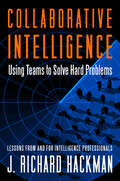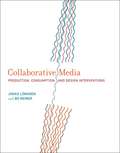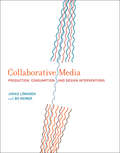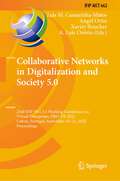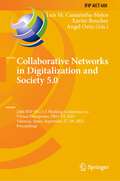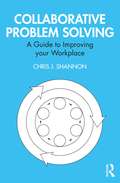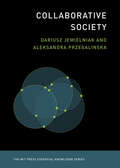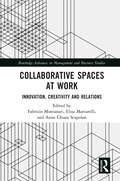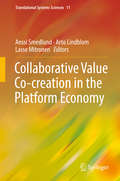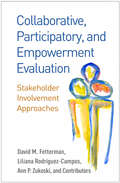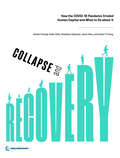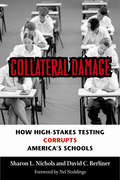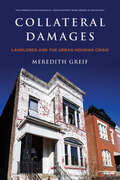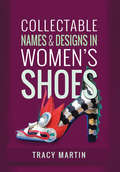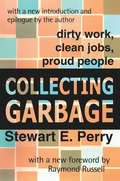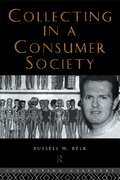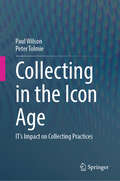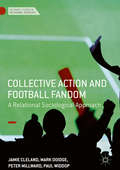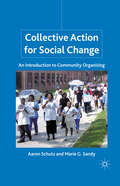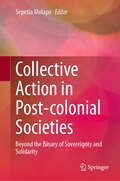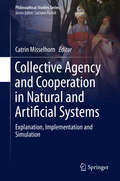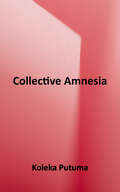- Table View
- List View
Collaborative Intelligence: The New Way to Bring Out the Genius, Fun, and Productivity in Any Team
by Mariano Battan Jim KalbachCreate better connected teams and hold more productive meetings In Collaborative Intelligence: Design Better Collaboration, Improve Team Productivity, and Build a Culture of Connection, the workplace collaboration experts at MURAL offer a holistic and comprehensive system for fixing today’s broken teamwork culture. This book introduces the emerging practice of collaboration design, a cutting-edge approach to crafting collaborative experiences with a high degree of intentionality so that they deliver extraordinary, repeatable outcomes. With a strong focus on activities and rituals that can be used by leaders and team members right now, the authors show businesses how they can innovate faster than ever. Readers will learn the skills they need to enable better collaboration, whether their teams are hybrid, remote, in-person, synchronous, or asynchronous. Based on decades of research, experience, and observations from working with thousands of teams globally in all kinds of collaboration spaces, this highly visual book provides the instruction you need to fix teamwork, transform your organization, and re-imagine what’s possible at work. You’ll also find: How to build playbooks of collaboration methods How to create an inclusive, equitable, and collaborative environment that invites participation and unlocks the genius of your teams How to access unprecedented insights into how collaboration happens in your organization Strategies for leading collaboration change at the organization levelA can’t-miss guide for knowledge-work professionals, Collaborative Intelligence provides the direction you’ve been looking for to help teams innovate together.
Collaborative Intelligence: Using Teams to Solve Hard Problems (Bk Business Ser.)
by J. Richard HackmanIntelligence professionals are commonly viewed as solo operators. But these days intelligence work is mostly about collaboration. Interdisciplinary and even inter-organizational teams are necessary to solve the really hard problems intelligence professionals face. Tragically, these teams often devolve into wheel-spinning, contentious assemblies that get nothing done. Or members may disengage from a team if they find its work frustrating, trivial, or a waste of their time. Even teams with a spirit of camaraderie may take actions that are flat-out wrong. But there is also good news. This book draws on recent research findings as well as Harvard Professor Richard Hackman’s own experience as an intelligence community researcher and advisor to show how leaders can create an environment where teamwork flourishes. Hackman identifies six enabling conditions – such as establishing clear norms of conduct and providing well-timed team coaching – that increase the likelihood that teams will be effective in any setting or type of organization.. Although written explicitly for intelligence, defense, crisis management, and law enforcement professionals it will also be valuable for improving team success in all kinds of leadership, management, service, and production teams in business, government, and nonprofit enterprises.
Collaborative Media: Production, Consumption, and Design Interventions
by Jonas Löwgren Bo ReimerWith many new forms of digital media--including such popular social media as Facebook, Twitter, and Flickr -- the people formerly known as the audience no longer only consume but also produce and even design media. Jonas L'wgren and Bo Reimer term this phenomenon collaborative media, and in this book they investigate the qualities and characteristics of these forms of media in terms of what they enable people to do. They do so through an interdisciplinary research approach that combines the social sciences and humanities traditions of empirical and theoretical work with practice-based, design-oriented interventions. L'wgren and Reimer offer analysis and a series of illuminating case studies -- examples of projects in collaborative media that range from small multidisciplinary research experiments to commercial projects used by millions of people. L'wgren and Reimer discuss the case studies at three levels of analysis: society and the role of collaborative media in societal change; institutions and the relationship of collaborative media with established media structures; and tribes, the nurturing of small communities within a large technical infrastructure. They conclude by advocating an interventionist turn within social analysis and media design.
Collaborative Media: Production, Consumption, and Design Interventions (The\mit Press Ser.)
by Bo Reimer Jonas LowgrenA thorough analysis of contemporary digital media practices, showing how people increasingly not only consume but also produce and even design media. With many new forms of digital media–including such popular social media as Facebook, Twitter, and Flickr—the people formerly known as the audience no longer only consume but also produce and even design media. Jonas Löwgren and Bo Reimer term this phenomenon collaborative media, and in this book they investigate the qualities and characteristics of these forms of media in terms of what they enable people to do. They do so through an interdisciplinary research approach that combines the social sciences and humanities traditions of empirical and theoretical work with practice-based, design-oriented interventions. Löwgren and Reimer offer analysis and a series of illuminating case studies—examples of projects in collaborative media that range from small multidisciplinary research experiments to commercial projects used by millions of people. Löwgren and Reimer discuss the case studies at three levels of analysis: society and the role of collaborative media in societal change; institutions and the relationship of collaborative media with established media structures; and tribes, the nurturing of small communities within a large technical infrastructure. They conclude by advocating an interventionist turn within social analysis and media design.
Collaborative Networks in Digitalization and Society 5.0: 23rd IFIP WG 5.5 Working Conference on Virtual Enterprises, PRO-VE 2022, Lisbon, Portugal, September 19–21, 2022, Proceedings (IFIP Advances in Information and Communication Technology #662)
by Luis M. Camarinha-Matos Angel Ortiz Xavier Boucher A. Luís OsórioThis book constitutes the refereed proceedings of the 23rd IFIP WG 5.5 Working Conference on Virtual Enterprises, PRO-VE 2022, held in Lisbon, Portugal, in September 2022. The 55 papers presented were carefully reviewed and selected from 119 submissions. They provide a comprehensive overview of major challenges and recent advances in various domains related to the digital transformation and collaborative networks and their applications with a strong focus on the following areas related to the main theme of the conference: sustainable collaborative networks; sustainability via digitalization; analysis and assessment of business ecosystems; human factors in collaboration 4.0; maintenance and life-cycle management; policies and new digital services; safety and collaboration management; simulation and optimization; complex collaborative systems and ontologies; value co-creation in digitally enabled ecosystems; digitalization strategy in collaborative enterprises’ networks; pathways and tools for DIHs; socio-technical perspectives on smart product-service systems; knowledge transfer and accelerated innovation in FoF; interoperability of IoT and CPS for industrial CNs; sentient immersive response network; digital tools and applications for collaborative healthcare; collaborative networks and open innovation in education 4.0; collaborative learning networks with industry and academia; and industrial workshop.
Collaborative Networks in Digitalization and Society 5.0: 24th IFIP WG 5.5 Working Conference on Virtual Enterprises, PRO-VE 2023, Valencia, Spain, September 27–29, 2023, Proceedings (IFIP Advances in Information and Communication Technology #688)
by Luis M. Camarinha-Matos Angel Ortiz Xavier BoucherThis book constitutes the refereed proceedings of the 24th IFIP WG 5.5 Working Conference on Virtual Enterprises, PRO-VE 2023, held in Valencia, Spain, in September 2023. The 59 papers presented in this book were carefully reviewed and selected from 119 submissions. They provide a comprehensive overview of the major challenges in sustainability of collaborative ecosystems; risks, security and resilience in networks; collaborative value creation and services; collaborative interactions and human-centered networks; skills and enabling technologies; collaborative healthcare and agile production; and AI, digital twins, and intelligent frameworks.
Collaborative Problem Solving: A Guide to Improving your Workplace
by Chris J. ShannonDrawing on knowledge from process improvement, organisation theory, human resource management, change management, occupational health and safety, and other fields, the book is a practical, easy-to-read guide to problem solving. Illustrated with a series of short case studies, this book provides an integrated approach to problem solving in the workplace. Collaborative Problem Solving walks through the steps in the problem solving process, introducing dozens of tools, techniques, and concepts to use throughout. Chris J. Shannon describes the behaviours to practice which are most conducive to creating a positive problem solving culture based on curiosity, collaboration, and evidence-based thinking. This book explains why successful problem solving is a collaborative process and provides tools and techniques for responding to other people’s behaviour when designing and implementing solutions. Offering practical advice on problem solving in an easy-to-understand way, this book is aimed at people working in office environments, service industries, and knowledge organisations, enabling them to feel confident in applying the knowledge from the book in their own workplace.
Collaborative Society (The MIT Press Essential Knowledge Series)
by Dariusz Jemielniak Aleksandra PrzegalinskaHow networked technology enables the emergence of a new collaborative society. Humans are hard-wired for collaboration, and new technologies of communication act as a super-amplifier of our natural collaborative mindset. This volume in the MIT Press Essential Knowledge series examines the emergence of a new kind of social collaboration enabled by networked technologies. This new collaborative society might be characterized as a series of services and startups that enable peer-to-peer exchanges and interactions though technology. Some believe that the economic aspects of the new collaboration have the potential to make society more equitable; others see collaborative communities based on sharing as a cover for social injustice and user exploitation.The book covers the “sharing economy,” and the hijacking of the term by corporations; different models of peer production, and motivations to participate; collaborative media production and consumption, the definitions of “amateur” and “professional,” and the power of memes; hactivism and social movements, including Anonymous and anti-ACTA protest; collaborative knowledge creation, including citizen science; collaborative self-tracking; and internet-mediated social relations, as seen in the use of Instagram, Snapchat, and Tinder. Finally, the book considers the future of these collaborative tendencies and the disruptions caused by fake news, bots, and other challenges.
Collaborative Spaces at Work: Innovation, Creativity and Relations (Routledge Advances in Management and Business Studies)
by Fabrizio Montanari Elisa Mattarelli Anna Chiara ScapolanCollaborative spaces are more than physical locations of work and production. They present strong identities centered on collaboration, exchange, sense of community, and co-creation, which are expected to create a physical and social atmosphere that facilitates positive social interaction, knowledge sharing, and information exchange. This book explores the complex experiences and social dynamics that emerge within and between collaborative spaces and how they impact, sometimes unexpectedly, on creativity and innovation. Collaborative Spaces at Work is timely and relevant: it will address the gap in critical understandings of the role and outcomes of collaborative spaces. Advancing the debate beyond regional development rhetoric, the book will investigate, through various empirical studies, if and how collaborative spaces do actually support innovation and the generation of new ideas, products, and processes. The book is intended as a primary reference in creativity and innovation, workspaces, knowledge and creative workers, and urban studies. Given its short chapters and strong empirical orientation, it will also appeal to policy makers interested in urban regeneration, sustaining innovation, and social and economic development, and to managers of both collaborative spaces and companies who want to foster creativity within larger organizations. It can also serve as a textbook in master’s degrees and PhD courses on innovation and creativity, public management, urban studies, management of work, and labor relations.
Collaborative Value Co-creation in the Platform Economy (Translational Systems Sciences #11)
by Anssi Smedlund Arto Lindblom Lasse MitronenThis book offers a service science perspective on platform orchestration and on collaborative consumption, providing an overview of research topics related to service dominant logic in multi-sided markets. The chapters give an international and multi-disciplinary overview of the current topics of digital service platforms from many angles. This overview helps in filling the gap between service science and recent research of the platform economy and paves the way for future service platform research. Open standards and distributed databases such as blockchain configurations increase the connectivity of business ecosystems as devices and systems exchange data with each other instead of through intermediaries. This exchange opens up opportunities for new value constellations, makes services globally scalable, and connects local service systems as integrated systems of systems. The book brings together established academics from a number of disciplines. This collaboration makes it possible to provide novel constructs and empirical results that help the reader to understand how value is co-created and orchestrated in the era of digital service platforms. In addition to theory building, practical implications for wider managerial and policy use are highlighted. The topics in this book are related to service platform technologies; organizational capabilities; and strategies and management in the contexts of retail, healthcare, and the public sector. A wide selection of case studies is used to demonstrate the implications of platforms for different service and economic contexts. Combining both theory and practice, this book is highly recommended for readers interested in the service and marketing point of view on the platform economy and for practitioners strategizing for scalable service platforms.Chapters 4 and 10 are available open access under a Creative Commons Attribution 4.0 International License via link.springer.com.
Collaborative, Participatory, and Empowerment Evaluation: Stakeholder Involvement Approaches
by David M. Fetterman And Contributors Liliana Rodríguez-Campos Ann P. ZukoskiFrom pioneering leaders in the field, this is the first book to provide a solid foundation for three major stakeholder involvement approaches: collaborative, participatory, and empowerment evaluation. Highlighting differences among the approaches, the authors focus on the role of the evaluator, who may be in charge of the evaluation, share control, or serve as a "critical friend," leaving stakeholders in control. Practitioners are guided to select and implement the most appropriate framework for the purpose and scope of a given evaluation and the needs of community members and funders. For each approach, a chapter on essential features is followed by two chapters presenting actual sample evaluations--for example, early childhood and community health initiatives, an aquarium, a project with Google, and more. The concluding chapter discusses similarities and circumstances in which the approaches can be combined.
Collapse and Recovery: How the COVID-19 Pandemic Eroded Human Capital and What to Do about It
by Silva Norbert Schady Alaka Holla Shwetlena SabarwalWorldwide, the COVID-19 pandemic has been an enormous shock to mortality, economies, and daily life. But what has received insufficient attention is the impact of the pandemic on the accumulation of human capital—the health, education, and skills—of young people. How large was the setback, and how far are we still from a recovery? Collapse and Recovery estimates the impacts of the pandemic on the human capital of young children, school-age children, and youth and discusses the urgent actions needed to reverse the damage. It shows that there was a collapse of human capital and that, unless that collapse is remedied, it is a time bomb for countries. Specifically, the report documents alarming declines in cognitive and social-emotional development among young children, which could translate into a 25 percent reduction in their earnings as adults. It finds that 1 billion children in low- and middle-income countries missed at least one year of in-person schooling. And despite enormous efforts in remote learning, children did not learn during the unprecedentedly long school closures, which could reduce future lifetime earnings around the world by US$21 trillion. The report quantifies the dramatic drops in employment and skills among youth that resulted from the pandemic as well as the substantial increase in the number of youth neither employed nor enrolled in education or training. In all of these age groups, the impacts of the pandemic were consistently worse for children from poorer backgrounds. These losses call for immediate action. The good news is that evidence-based policies can recover these losses. Collapse and Recovery reviews governments’ responses to the pandemic, assessing why there was a collapse in human capital accumulation, what was missing in the policy architecture to protect human capital during the crisis, and how governments can better prepare to withstand future shocks. It offers concrete policy recommendations to recover losses in human capital—programs that will end up paying for themselves in the long term. To better prepare for future shocks such as climate change and wars, the report emphasizes the need for solutions that bring health, education, and social protection programs together in an integrated human development system. If countries fail to act, the losses in human capital documented in this report will become permanent and last for multiple generations. The time to act is now.
Collateral Damage: How High-Stakes Testing Corrupts America's Schools
by David C. Berliner Nel Noddings Sharon L. NicholsDrawing on their extensive research, Nichols and Berliner document and categorize the ways that high-stakes testing threatens the purposes and ideals of the American education system. For more than a decade, the debate over high-stakes testing has dominated the field of education. This passionate and provocative book provides a fresh perspective on the issue and powerful ammunition for opponents of high-stakes tests. Their analysis is grounded in the application of Campbell's Law, which posits that the greater the social consequences associated with a quantitative indicator (such as test scores), the more likely it is that the indicator itself will become corrupted--and the more likely it is that the use of the indicator will corrupt the social processes it was intended to monitor. Nichols and Berliner illustrate both aspects of this "corruption," showing how the pressures of high-stakes testing erode the validity of test scores and distort the integrity of the education system. Their analysis provides a coherent and comprehensive intellectual framework for the wide-ranging arguments against high-stakes testing, while putting a compelling human face on the data marshalled in support of those arguments.
Collateral Damage: How High-Stakes Testing Corrupts America's Schools
by David C. Berliner Sharon L. NicholsDrawing on their extensive research, Nichols and Berliner document and categorize the ways that high-stakes testing threatens the purposes and ideals of the American education system. For more than a decade, the debate over high-stakes testing has dominated the field of education. This passionate and provocative book provides a fresh perspective on the issue and powerful ammunition for opponents of high-stakes tests. Their analysis is grounded in the application of Campbell&’s Law, which posits that the greater the social consequences associated with a quantitative indicator (such as test scores), the more likely it is that the indicator itself will become corrupted—and the more likely it is that the use of the indicator will corrupt the social processes it was intended to monitor. Nichols and Berliner illustrate both aspects of this &“corruption,&” showing how the pressures of high-stakes testing erode the validity of test scores and distort the integrity of the education system. Their analysis provides a coherent and comprehensive intellectual framework for the wide-ranging arguments against high-stakes testing, while putting a compelling human face on the data marshalled in support of those arguments.
Collateral Damages: Landlords and the Urban Housing Crisis (American Sociological Association's Rose Series)
by Meredith GreifChanges in federal housing policies over the past several decades shifted the primary responsibility for providing low-income renters with affordable housing from the government to private landlords. Federal, state, and local governments have passed laws to ensure that low-income renters are protected from illicit landlording practices. Yet we know little about how private landlords experience local housing regulations. In Collateral Damages, sociologist Meredith Greif examines how local laws affect private landlords and whether tenants are, in fact, being adequately protected. For three years, Greif followed sixty private landlords serving low- and moderate-income residents in the Cleveland, Ohio, metropolitan area to better understand how local regulations, such as criminal activity nuisance ordinances (CANOs) and local water billing regulations, affect their landlording practices. CANOs are intended to protect communities by discouraging criminal activity on private properties. Property owners can face financial and criminal sanctions if they do not abate nuisance activities, which can include littering, noise, drug use, and calls for police assistance, including calls for domestic violence. Local water billing regulations hold landlords responsible for delinquent water bills, even in cases where the account is registered in the tenant’s name. Greif finds that such laws often increase landlords’ sense of “financial precarity” – the real or perceived uncertainty that their business is financially unsustainable – by holding them responsible for behavior they feel is out of their control. Feelings of financial uncertainty led some landlords to use illegitimate business practices against their tenants, including harassment, oversurveillance, poor property upkeep, and illegal evictions. And to avoid to financial penalties associated with CANOs and delinquent water bills, some landlords engage in discriminatory screening of vulnerable potential tenants who are unemployed or have histories of domestic violence or drug use. In this sense, by promoting a sense of financial insecurity among landlords, laws meant to protect renters ultimately had the opposite effect. While some landlords, particularly those who rented a larger number of units, were able to operate their businesses both lawfully and profitably, the majority could not. Greif offers practical recommendations to address the concerns of small- and mid-sized landlords, such as regular meetings that bring landlords and local authorities together to engage in constructive dialogue about local housing policy, issues, and concerns. She also proposes policy recommendations to protect renters, such as establishing the right to counsel for lower-income tenants in eviction hearings and enacting a federal renter’s tax credit. Collateral Damages is an enlightening investigation on how local laws and practices perpetuate disadvantage among marginalized populations and communities, in ways that are hidden and often unintended.
Collectable Names and Designs in Women's Shoes
by Tracy MartinFull with innovative, sculptural and outrageous footwear this book celebrates all shoes from the pump to the platform and the court shoe to the stiletto.Shoes are no longer regarded just for their practical purpose of protecting the feet as they have now become iconic works of art that would not look out of place displayed in a gallery. Collectable Names and designs in Womens shoes celebrates and showcases an eclectic array of artistic footwear which has been created by renowned designers and also has the added element of being highly desirable with collectorsBeginning with a look at the history of shoes the book predominantly looks at designer offerings from the 20th and 21st Centuries. Packed full of information on the innovative shoe designers, where they gained their inspiration and how their fabulous footwear impacted on the fashion scene along with interesting facts and tips on the area of collecting shoes. Tracy Martin will prove there is literally a collectable heel to fit every foot from the more conservative to the downright outrageous which only the fashion forward would dare to wear.
Collecting Compensation Data from Employers
by Panel On Measuring Collecting Pay Information from U.S. Employers by Gender Race National OriginU. S. agencies with responsibilities for enforcing equal employment opportunity laws have long relied on detailed information that is obtained from employers on employment in job groups by gender and race/ethnicity for identifying the possibility of discriminatory practices. The U. S. Equal Employment Opportunity Commission (EEOC), the Office of Federal Contract Compliance programs of the U. S. Department of Labor, and the Civil Rights Division of the U. S. Department of Justice have developed processes that use these employment data as well as other sources of information to target employers for further investigation and to perform statistical analysis that is used in enforcing the anti-discrimination laws. The limited data from employers do not include (with a few exceptions) the ongoing measurement of possible discrimination in compensation. The proposed Paycheck Fairness Act of 2009 would have required EEOC to issue regulations mandating that employers provide the EEOC with information on pay by the race, gender, and national origin of employees. The legislation was not enacted. If the legislation had become law, the EEOC would have been required to confront issues regarding currently available and potential data sources, methodological requirements, and appropriate statistical techniques for the measurement and collection of employer pay data. The panel concludes that the collection of earnings data would be a significant undertaking for the EEOC and that there might be an increased reporting burden on some employers. Currently, there is no clearly articulated vision of how the data on wages could be used in the conduct of the enforcement responsibilities of the relevant agencies. Collecting Compensation Data from Employers gives recommendations for targeting employers for investigation regarding their compliance with antidiscrimination laws.
Collecting Garbage: Dirty Work, Clean Jobs, Proud People
by Raymond Russell Stewart E. PerryFirst Published in 2017. Routledge is an imprint of Taylor & Francis, an Informa company.
Collecting in a Consumer Society (Collecting Cultures)
by Russell W. BelkThis groundbreaking book examines the relationship between the development of the consumer society and the rise of collecting by individuals and institutions. Rusell Belk considers how and why people collect, as individuals, corporations and museums, and the impact this collecting has on us and our culture. Collecting in a Consumer Society outlines the history of museum collecting from ancient civilizations to the present. It also looks at aspects of consumer culture - advertizing, department stores, mass merchandizing, consumer desires, and how this relates to the activity of collecting. Collecting in a Consumer Society is the first book to focus on collecting as material consumption. This is a provocative and engaging book, essential reading for anyone involved with the process of collecting.
Collecting in the Icon Age: IT's Impact on Collecting Practices
by Paul Wilson Peter TolmieThis book is about the impact of the 'Icon Age' on people's collecting practices. The Icon Age is when objects began to be represented on computer screens via icons. It focuses on how the Icon Age has affected how people do things associated with collections, from their inception to their disposal and everything in-between. It also looks at different kinds of collections and how they are managed across seven key collecting contexts: accumulations; libraries; filing-systems; archives; museums and galleries; private collections; and amateur collections. To inform this, studies were undertaken of how collecting was done across a range of diverse collections. The book also presents a taxonomy of collectable object types, including new types of objects that have appeared since the onset of the Icon Age. The book draws out important lessons regarding the impact of IT on collecting practices and contexts. It also suggests that, where contexts use digital practices, these exhibit an increasing level of conformity. The book concludes by looking beyond the Icon Age to the potential impact on collecting of new kinds of computing technology.
Collective Action and Football Fandom: A Relational Sociological Approach (Palgrave Studies in Relational Sociology)
by Peter Millward Jamie Cleland Mark Doidge Paul WiddopThis book draws upon a relational sociological paradigm to explore the processes of collective action in football fandom across Europe and the UK. Through a range of case studies, the authors address pertinent themes in football fandom, including anti-discrimination, ‘home,’ ticketing, name changes, ‘ownership,’ and broader leftist politics. Each of these case studies engages with the theoretical framework of cultural relational sociology, highlighting the different social and cultural changes English and European football has undergone, often over a very short period of time.
Collective Action for Social Change: An Introduction to Community Organizing
by Aaron Schutz Marie G. SandyThis book draws from both authors' extensive experience participating in community organizing efforts and teaching courses on community organizing to novices.
Collective Action in Post-colonial Societies: Beyond the Binary of Sovereignty and Solidarity
by Sepetla MolapoThis book offers an exploration of collective action by bringing together the themes of sovereignty and solidarity in post-colonial societies in Africa and beyond. It does so against a common tradition of writing about collective action that assumes an opposition between the state as a legal framework of unity and social movements that express the aspirations of marginalized people. The book’s examination of collective action resists this binary division. It states that sovereignty can be imagined beyond the confines of the law and consequently beyond the centrality of the state. Power therefore appears as a construct of forces and factors that signal or gesture to a complex but fascinating way of imagining collective action. These forces and factors open our eyes to the dynamics of life in post-colonial societies in ways that the understanding of sovereignty centred on law conceals. Brought into an intimacy with solidarity, sovereignty opens collective action to nuanced, complex and multiple configurations that surpass binary thinking. This is an innovative approach and of interest to students and scholars from across the social sciences.
Collective Agency and Cooperation in Natural and Artificial Systems: Explanation, Implementation and Simulation (Philosophical Studies Series #122)
by Catrin MisselhornThis book brings together philosophical approaches to cooperation and collective agency with research into human-machine interaction and cooperation from engineering, robotics, computer science and AI. Bringing these so far largely unrelated fields of study together leads to a better understanding of collective agency in natural and artificial systems and will help to improve the design and performance of hybrid systems involving human and artificial agents. Modeling collective agency with the help of computer simulations promises also philosophical insights into the emergence of collective agency. The volume consists of four sections. The first section is dedicated to the concept of agency. The second section of the book turns to human-machine cooperation. The focus of the third section is the transition from cooperation to collective agency. The last section concerns the explanatory value of social simulations of collective agency in the broader framework of cultural evolution.
Collective Amnesia
by Koleka PutumaThis highly-anticipated debut collection from one of the country’s most acclaimed young voices marks a massive shift in South African poetry. Koleka Putuma’s exploration of blackness, womxnhood and history in Collective Amnesia is fearless and unwavering. Her incendiary poems demand justice, insist on visibility and offer healing. In them, Putuma explodes the idea of authority in various spaces – academia, religion, politics, relationships – to ask what has been learnt and what must be unlearnt. Through grief and memory, pain and joy, sex and self-care, Collective Amnesia is a powerful appraisal, reminder and revelation of all that has been forgotten and ignored, both in South African society, and within ourselves.Koleka Putuma was born in Port Elizabeth in 1993. An award-winning performance poet, facilitator and theatre-maker, her plays include UHM and Mbuzeni, as well as two two plays for children, Ekhaya and Scoop. Her work has travelled around the world, with her poetry garnering her national prizes, such as the 2014 National Poetry Slam Championship and the 2016 PEN South Africa Student Writing Prize.

